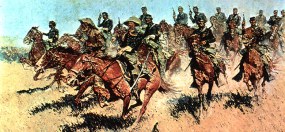Okay, so I admit it.
I’m the kind of guy who likes the one item on the restaurant menu that no one else orders.
I’m the kind of guy who when faced with a daily drive from point A to point B attempts to find a different route between those two points every time.
I’m the kind of guy who gave up on self-help books years ago because I never fit into any of the categories the author would use to illustrate solutions.
I’m pretty much always the odd man out. The contrarian. The iconoclast. The weirdo.
When people find out that I write speculative fiction and then discover that I’ve never read through The Lord of the Rings books because I found them dull, well my weirdness takes on new levels.
That said, I did enjoy the Rings movies. And again, being the weirdo, I definitely thought The Two Towers was the best of the three. My reasoning is that I found the most biblical imagery in the second film.
When Gandalf tells Aragorn to look up when things appear most desperate and expect to see him at a certain hour, I could not help but think of this passage:
And the mind of the king of Syria was greatly troubled because of this thing, and he called his servants and said to them, “Will you not show me who of us is for the king of Israel?” And one of his servants said, “None, my lord, O king; but Elisha, the prophet who is in Israel, tells the king of Israel the words that you speak in your bedroom.” And he said, “Go and see where he is, that I may send and seize him.” It was told him, “Behold, he is in Dothan.” So he sent there horses and chariots and a great army, and they came by night and surrounded the city. When the servant of the man of God rose early in the morning and went out, behold, an army with horses and chariots was all around the city. And the servant said, “Alas, my master! What shall we do?” He said, “Do not be afraid, for those who are with us are more than those who are with them.” Then Elisha prayed and said, “O LORD, please open his eyes that he may see.” So the LORD opened the eyes of the young man, and he saw, and behold, the mountain was full of horses and chariots of fire all around Elisha.
—2 Kings 6:11-17
At the bleakest moment in the battle at Helm’s Deep, Aragorn, remembering Gandalf’s words, looks to the rim of the valley and sees it lined with a vast army headed by Gandalf.
At the bleakest moment, a sign of hope. The very presence of grace. Once doomed, now saved.
How many Westerns made their money by sending the cavalry over the hill to rescue the beleaguered heroes pinned down by the relentless tide of opposition?  The trumpet cry as the rescuers spurred on their chargers. The enemy routed.
The trumpet cry as the rescuers spurred on their chargers. The enemy routed.
Grace, all of it.
You would think, then, that in a country that bills itself as a Christian nation, in a land steeped in the last desperate stand before the cavalry arrives, that we would be drowning in grace as a people. You would think that our whole lives would be devoted to dispensing grace as often and to as many as we can.
You would think.
I spent most of the evening thinking about this disconnect. How is it that grace is so elusive in the United States? What is it about us that we can’t resist the spectacle of watching another human being go down in flames? How can it be that their ultimate fate means so little to us?
Most of you know that the foreclosure rate in this country is running about three times higher than normal. Where I live, the number of abandoned houses—those fled by their owners, no “For Sale” sign in the front yard, no realtor in sight—borders on the epidemic.
We as Christians may talk about grace, but if we want a painful example of how out of touch we are concerning grace, the very lifeblood of the Church, look no further than those families who lost their homes. How is it that those families seem to vanish into the ether, melting away to nothing like hoarfrost assaulted by hot breath? Where do they go?
It saddens me that I don’t know. All I do know is that they were in trouble and no one was there for them in the midst of it. All the potential in the world for Christians to step in and demonstrate grace, yet it never came to be. And now, as if sucked into that mysterious realm where singleton socks go, that family is gone. Sometimes they don’t even bother to shut the door behind them.
And we who are wise can pontificate about why they failed. We can talk about greed. We can talk about poor choices. We can talk about moral failures. We can blame it on the times, the media, the economy, the war, the peace, the current president, the next president—heck, we can talk for whole years at a time, but none of our talk reveals bare naked grace to the ones who need it most.
Is anyone besides me grieved by this? Is anyone else hounded by our lack of care, our inability to somehow take the grace we might have been shown in the past and minister it to someone in desperate need?
How is it that we hate failure in other people, yet we expect others to feel for us when we go down in flames?
There’s not a person reading this now who is not excruciatingly close to losing it all. Do we realize how readily our carefully crafted lifestyles can go to pieces in a matter of weeks? One bad investment. One miscalculation at work. One illness. Poof, and its all gone.
It doesn’t matter how smart you are, how healthy, how wealthy, how prepared, or how risk averse. When that time comes, it comes. You’ll need that grace. You’ll need someone to love you no matter how shattered you might be, someone who can minister the grace of Jesus Christ to you.
Now what if there’s no one there?
We all have to be the cavalry at some point in life. We all have to ride into the flaming arrows, the poison darts, the thick haze of flying lead. Because there’s no way anyone’s going to be our cavalry when we need it if we were never there for them.
 I suspect it’s all too common for a person to walk into a typical church on Sunday with that question burning in the heart and leave an hour later with it unresolved—and perhaps even unadressed entirely. That a person can be utterly alone in a church packed with people…well, it happens, doesn’t it?
I suspect it’s all too common for a person to walk into a typical church on Sunday with that question burning in the heart and leave an hour later with it unresolved—and perhaps even unadressed entirely. That a person can be utterly alone in a church packed with people…well, it happens, doesn’t it?
 They look normal on the outside, but on the inside they are hemorrhaging emotionally. Because we can’t see the wounds, we think everything is peachy with them—until one day they get up, put on a nice pair of slacks with coordinating shirt, tell the wife they’re going to clear their head by taking a morning constitutional, turn up their jacket collar against the world, gently close the door behind them, and proceed to walk into dark, chill waters.
They look normal on the outside, but on the inside they are hemorrhaging emotionally. Because we can’t see the wounds, we think everything is peachy with them—until one day they get up, put on a nice pair of slacks with coordinating shirt, tell the wife they’re going to clear their head by taking a morning constitutional, turn up their jacket collar against the world, gently close the door behind them, and proceed to walk into dark, chill waters. The trumpet cry as the rescuers spurred on their chargers. The enemy routed.
The trumpet cry as the rescuers spurred on their chargers. The enemy routed.